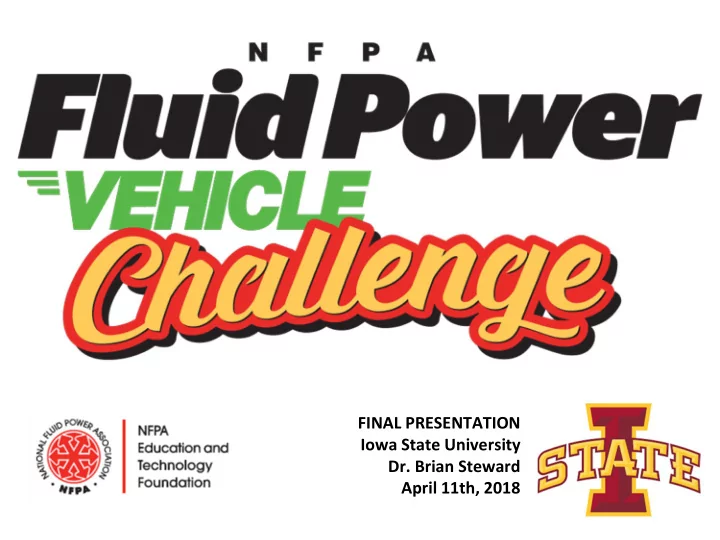

FINAL PRESENTATION Iowa State University Dr. Brian Steward April 11th, 2018
Meet the Iowa State Team From L-R: Dr. Brian Steward, Connor West, Garrett Fjeld, Aaron Miller, Kyle Blaylock, Ethan Parker & Andrew Whitaker
Problem Statement Design and build a human powered vehicle that is propelled by fluid power, will store potential energy and re-generate energy while braking.
Midway Review Recap
Objectives Design and build a vehicle that: 1. Will effectively compete in the Fluid Power Vehicle Challenge. 1. Will be safe for the operator to use. 1. Is easy for the rider to operate under all three challenge conditions.
Vehicle Design • Bike frame choice (GMC Denali aluminum frame) • Utilizing the original sprocket set on the bike • Utilizing gears to gain a mechanical advantage at the wheel
Relocation of Chain & Sprocket Set • Moves sprocket set under seat • Keeps chain out of the rider’s way • Able to reuse rear derailleur system to change gears
Original Hydraulic Circuit
Initial Analysis • Best possible gear ratio of 1.09:1 (based on bike gears, pump to motor displacement and assumed efficiencies) • Decided to use a final drive gear ratio of 5:1 to increase the speed of the wheel
Final Project Design, Assembly and Testing
The Finished Product
Vehicle Construction
Pump and Sprocket Set ● Able to change gears in take off, speed up, and cruise ● Gives more torque when needed ● Makes the bike adjustable to changing environments
Mounting the Motor Initial Design ● Right hand side of the bike ● Gear Ratio (5.67:1)
Component Fabrication ● Sprocket couple to pump ● Gear keyway and brackets on motor ● Gear to hub attachment ● Motor mounts ● In house FAB department ● In house WaterJet
Component Fabrication Fluid Reservoir • A small reservoir was desired to reduce weight and space allocation • Fabricated our own for ease of mounting and appropriate fluid volume • The tank was welded and air tested for leaks
Component Fabrication Hoses • Hoses were cut with a chop saw • Hose ends attached with a hydraulic hose crimper borrowed from a club within the department
Final Components List • 1 - Normally Open Directional Control Valve • 1 - Normally Closed Directional Control Valve • 1 - Proportional Relief Valve • 2 - Ball Valves • 3 - Check Valves (2 Inline and 1 Block) • 1 - Needle Valve • 2 - Accumulators (1 Quart and 1 Pint) • 1 - 6.6 cc/rev Hydraulic Gear Pump • 1 - 10.2 cc/rev Hydraulic Gear Motor • Hydraulic Hose (3400 psi rating) • Various Hydraulics Fittings
Fluid Power Circuit Design
Finished Fluid Power Circuit Front Rear
Vehicle Testing • Changed from a solid hub to a free hub due to loosening threads between the gear and the axle. • Upon initial vehicle testing, the wheel would turn if it was off the ground but not with a load. Therefore more torque was required. • Changed gear ratio from 5:1 to 1:1 with a chain system.
Vehicle Testing • Redesigned previous gear assembly to reduce gear ratio down to 1.67:1 • Machined the previous drive gear to fit the motor shaft and keyway (this system replaced the chain system)
Vehicle Testing • Tested the circuit for use of stored energy and found that the valves used had internal check valves that weren’t allowing energy storage. • Replaced the normally open valve with a check valve and the normally closed valve with a ball valve.
Vehicle Testing • After attempting to use stored energy in one accumulator for propulsion, the decision was made to add a second accumulator to gain volume for longer propulsion time. • After riding the bike, the decision was made to design training wheels to ensure balance for the rider. • Training Wheels • Parts cut on waterjet • Bent on an ironworker • Gussets welded on – Adds stability – Allows for a safer ride
Lessons Learned • Torque at the wheel is more important than speed at the wheel with a relatively inefficient system (e.g. hydraulics). • Could have used a pump and motor with similar displacements for better torque output and pedaling consistency.
Lessons Learned • Gather all valve information and symbols prior to installation to understand their function and flow paths. • Take pictures throughout assembly to document project progress and changes made.
Thank You to Our Sponsors!
Questions
Recommend
More recommend